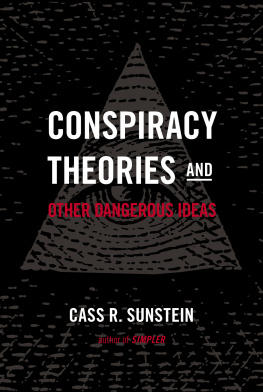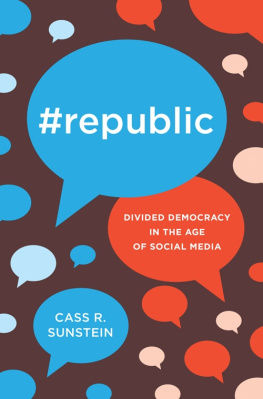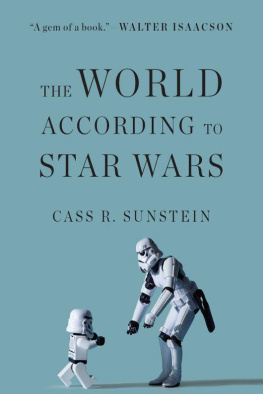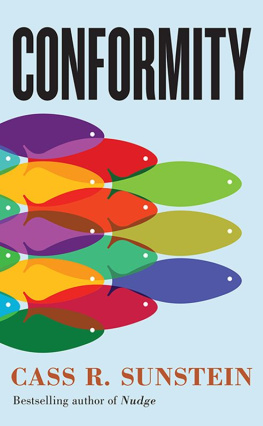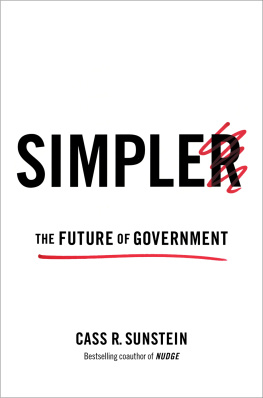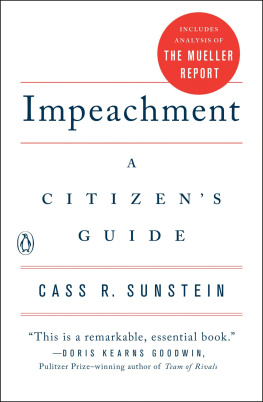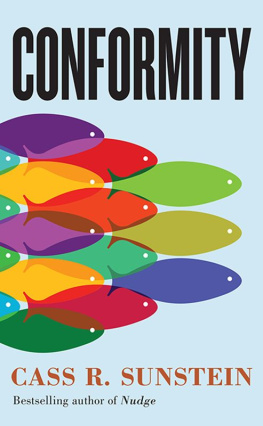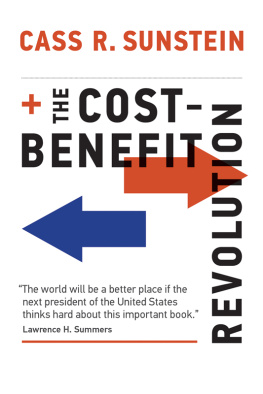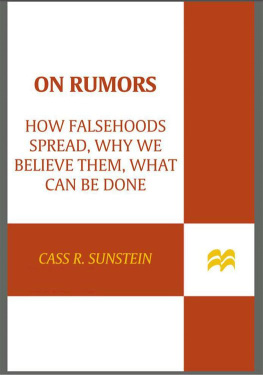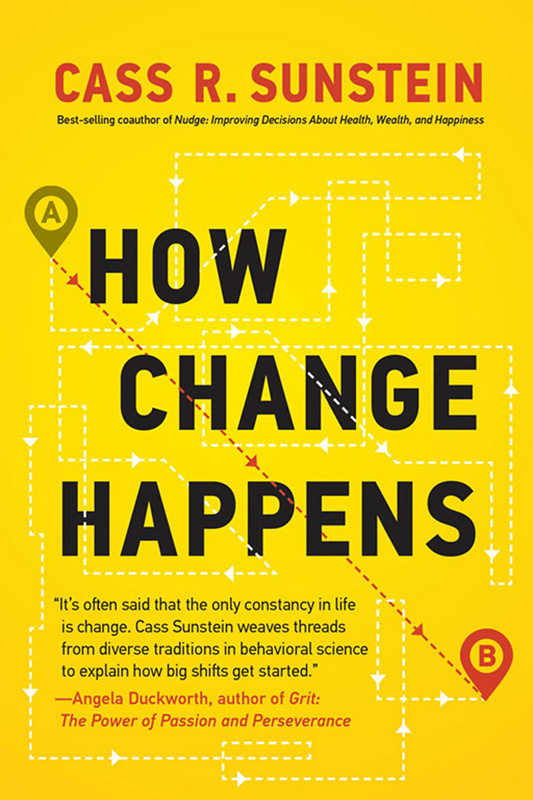Table of Contents
Guide
How Change Happens
Cass R. Sunstein
The MIT Press
Cambridge, Massachusetts
London, England
2019 Cass R. Sunstein
All rights reserved. No part of this book may be reproduced in any form by any electronic or mechanical means (including photocopying, recording, or information storage and retrieval) without permission in writing from the publisher.
This book was set in Stone by Toppan Best-set Premedia Limited. Printed and bound in the United States of America.
Library of Congress Cataloging-in-Publication Data
Names: Sunstein, Cass R., author.
Title: How change happens / Cass R. Sunstein.
Description: Cambridge, MA : MIT Press, [2019] | Includes bibliographical references and index.
Identifiers: LCCN 2018026995 | ISBN 9780262039574 (hardcover : alk. paper)
eISBN 9780262351898
Subjects: LCSH: Social change. | Social groups. | Common good. | Decision making
Classification: LCC HM831 .S86 2019 | DDC 303.4--dc23 LC record available at https://lccn.loc.gov/2018026995
ePub Version 1.0
Opposition? How would anybody know? How would anybody know what somebody else opposes or doesnt oppose? That a man says he opposes or doesnt oppose depends upon the circumstances, where, and when, and to whom, and just how he says it. And then you still must guess why he says what he says. So, too, even in action.
Carl Klingelhofer, former Nazi
If I had known that not a single lunch counter would open as a result of my action I could not have done differently than I did. If I had known violence would result, I could not have done differently than I did. I am thankful for the sit-ins if for no other reason than that they provided me with an opportunity for making a slogan into a reality, by turning a decision into an action. It seems to me that this is what life is all about.
Sandra Cason
We are all Expressionists part of the time. Sometimes we just want to scream loudly at injustice, or to stand up and be counted. These are noble motives, but any serious revolutionist must often deprive himself of the pleasures of self-expression. He must judge his actions by their ultimate effects on institutions.
Herbert Simon
Notes
Milton Mayer, They Thought They Were Free 93 (1955/2017).James Miller, Democracy Is in the Streets: From Port Huron to the Siege of Chicago 52 (1987).Herbert A. Simon, Models of My Life 281 (1991).
Preface
A few decades ago, I testified in Congress about President Bill Clintons dont ask, dont tell policy, which allowed gays and lesbians to serve in the US military, but only on condition that they did not disclose their sexual orientation. After my testimony, a member of Congress came up to me and said to me, with evident nostalgia, In my day, we didnt have any homosexuals. He paused and added, Well, maybe we had one. There was a guy who lived by himself, up on a hill.
How does social change happen? One answer points to the role of social norms, which can be both powerful (in the sense that they greatly affect behavior) and fragile (in the sense that they can collapse in a short time). If norms lead people to silence themselves, a status quo can persisteven if some or many people hate it, and even if those who seem to support it are actually pretty indifferent to it. One day, someone challenges the norm. Maybe its a child who says that the Emperor has no clothes. Maybe its a guy who lives by himself, up on a hill. After that small challenge, others may begin to say what they think. Once that happens, a drip can become a flood.
Most of us live, at least some of the time, in accordance with norms that we abhor. We might not think about them; they are part of lifes furniture. But in our heart of hearts, we abhor them. The problem is that none of us can change a norm on our own. To be sure, we can defy a norm, but defiance comes at a cost, and it may end up entrenching rather than undermining existing norms. What is needed is some kind of movement, initiated by people who say that they disapprove of the norm, and succeeding when some kind of tipping point is reached, by which time it is socially costless, and maybe beneficial, and maybe even mandatory, to say: Me Too.
Thats a stylized version of what has happened with respect to sexual orientation in many nations. But the same dynamics help capture a host of social movements, including those that involve Catholicism, the French Revolution, the creation of Israel, the Universal Declaration of Human Rights, the collapse of the Soviet Union, disability discrimination, age discrimination, animal rights, the rise of Barack Obama and Donald Trump, Brexit, nationalism, white supremacy, and the abolition of slavery. These movements are of course different in important ways. Some of them are unambiguously good, while others are harder to evaluate, and still others are deeply troubling. But in all of them, suppressed beliefs and values, including suppressed outrage, started to get some oxygen. Once they did, change was inevitable.
It was also hard or perhaps impossible to anticipate those social movements. A central reason is that because people falsified their preferences, individuals did not know what their fellow citizens actually thought. In the face of preference falsification, the circumstances are right for unleashing social changebut because preferences are falsified, few people may be aware of that fact.
Another reason for the unpredictability is the overriding importance of social interactions. For change to occur, interactions need to produce, at just the right times and places, a growing sense that an existing norm is vulnerable, and that may or may not happen. Serendipity might be crucial. Who talks to whom at the right point? What is covered in the right newspaper? Who retweets what, and exactly when?
Science fiction writers like to explore counterfactual historyhistorical arcs in which the South won the Civil War, Hitler devoted his entire life to painting, John F. Kennedy wasnt assassinated, or Donald Trump decided to ramp up his real estate activities rather than to run for president. At their most intriguing, counterfactual histories emphasize small shifts (or nudges) that produced massive changes; they make it plausible to think that with a little push or pull, whole nations might have ended up looking radically different.
Because history is only run once, we cant know when thats true. But we do observe large shifts in short time frames. If we have a sense of the mechanisms that account for those shifts, we might be newly aware of the extent to which things we now take for granted were not exactly predestined, and of how with a little pressure at the right time, the coming decades might take startlingly different courses. (I know that these claims raise many questions; I will explore them in due course.)
This book consists of sixteen chapters. While they do not make for a unitary narrative, they are connected by an effort to connect findings in behavioral science with enduring issues in law and policy, and by an effort to show how seemingly small perturbations can often produce big shifts. The first three chapters explore the power of social norms; the importance of social cascades; the phenomenon of group polarization; and the expressive function of law. I emphasize that in many cases, people are unleashed, for better or for worse, and that in other cases, something very different happens, as people end up holding views that they would not have entertained before. A general theme is the shift from the unsayable, and even the unthinkable, to the conventional wisdom (and vice-versa).


